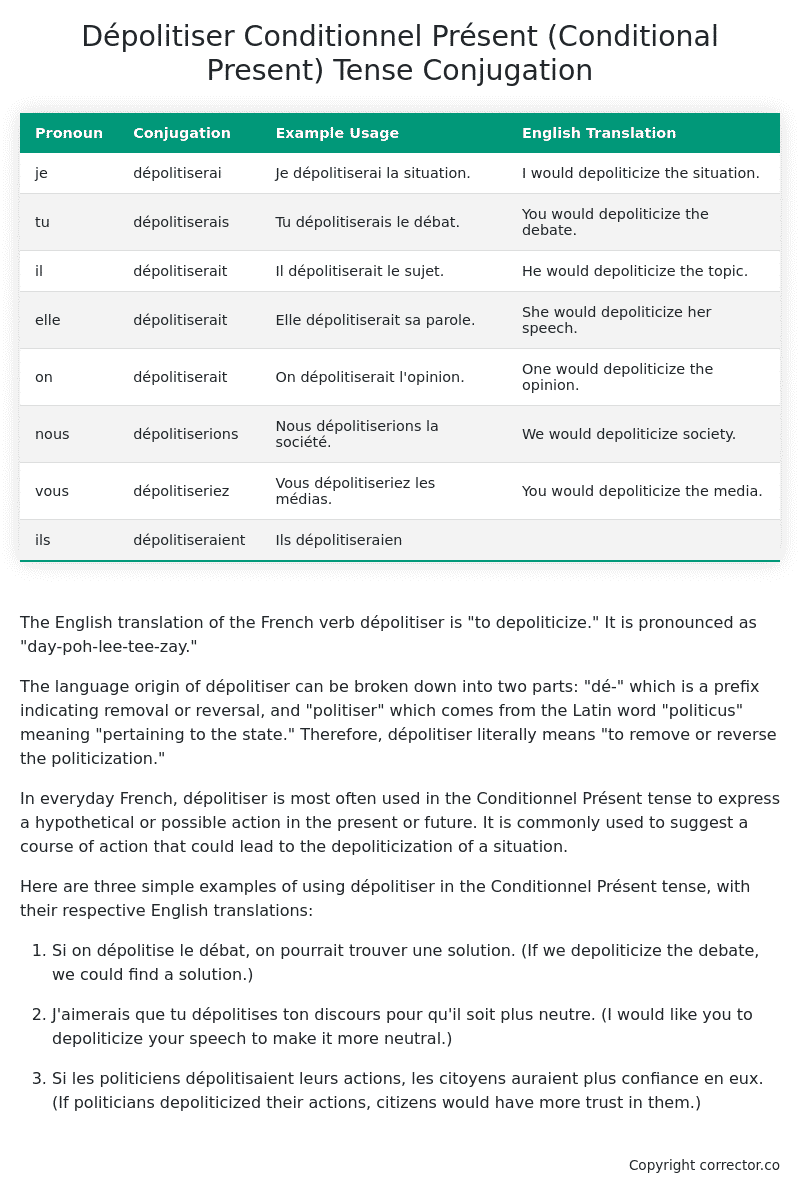Conditionnel Présent (Conditional Present) Tense Conjugation of the French Verb dépolitiser
Introduction to the verb dépolitiser
The English translation of the French verb dépolitiser is “to depoliticize.” It is pronounced as “day-poh-lee-tee-zay.”
The language origin of dépolitiser can be broken down into two parts: “dé-” which is a prefix indicating removal or reversal, and “politiser” which comes from the Latin word “politicus” meaning “pertaining to the state.” Therefore, dépolitiser literally means “to remove or reverse the politicization.”
In everyday French, dépolitiser is most often used in the Conditionnel Présent tense to express a hypothetical or possible action in the present or future. It is commonly used to suggest a course of action that could lead to the depoliticization of a situation.
Here are three simple examples of using dépolitiser in the Conditionnel Présent tense, with their respective English translations:
-
Si on dépolitise le débat, on pourrait trouver une solution.
(If we depoliticize the debate, we could find a solution.) -
J’aimerais que tu dépolitises ton discours pour qu’il soit plus neutre.
(I would like you to depoliticize your speech to make it more neutral.) -
Si les politiciens dépolitisaient leurs actions, les citoyens auraient plus confiance en eux.
(If politicians depoliticized their actions, citizens would have more trust in them.)
Table of the Conditionnel Présent (Conditional Present) Tense Conjugation of dépolitiser
| Pronoun | Conjugation | Example Usage | English Translation |
|---|---|---|---|
| je | dépolitiserai | Je dépolitiserai la situation. | I would depoliticize the situation. |
| tu | dépolitiserais | Tu dépolitiserais le débat. | You would depoliticize the debate. |
| il | dépolitiserait | Il dépolitiserait le sujet. | He would depoliticize the topic. |
| elle | dépolitiserait | Elle dépolitiserait sa parole. | She would depoliticize her speech. |
| on | dépolitiserait | On dépolitiserait l’opinion. | One would depoliticize the opinion. |
| nous | dépolitiserions | Nous dépolitiserions la société. | We would depoliticize society. |
| vous | dépolitiseriez | Vous dépolitiseriez les médias. | You would depoliticize the media. |
| ils | dépolitiseraient | Ils dépolitiseraien |
Other Conjugations for Dépolitiser.
Le Present (Present Tense) Conjugation of the French Verb dépolitiser
Imparfait (Imperfect) Tense Conjugation of the French Verb dépolitiser
Passé Simple (Simple Past) Tense Conjugation of the French Verb dépolitiser
Passé Composé (Present Perfect) Tense Conjugation of the French Verb dépolitiser
Futur Simple (Simple Future) Tense Conjugation of the French Verb dépolitiser
Futur Proche (Near Future) Tense Conjugation of the French Verb dépolitiser
Plus-que-parfait (Pluperfect) Tense Conjugation of the French Verb dépolitiser
Passé Antérieur (Past Anterior) Tense Conjugation of the French Verb dépolitiser
Futur Antérieur (Future Anterior) Tense Conjugation of the French Verb dépolitiser
Subjonctif Présent (Subjunctive Present) Tense Conjugation of the French Verb dépolitiser
Subjonctif Passé (Subjunctive Past) Tense Conjugation of the French Verb dépolitiser
Subjonctif Imparfait (Subjunctive Imperfect) Tense Conjugation of the French Verb dépolitiser
Conditionnel Présent (Conditional Present) Tense Conjugation of the French Verb dépolitiser (this article)
Conditionnel Passé (Conditional Past) Tense Conjugation of the French Verb dépolitiser
L’impératif Présent (Imperative Present) Tense Conjugation of the French Verb dépolitiser
L’infinitif Présent (Infinitive Present) Tense Conjugation of the French Verb dépolitiser
Struggling with French verbs or the language in general? Why not use our free French Grammar Checker – no registration required!
Get a FREE Download Study Sheet of this Conjugation 🔥
Simply right click the image below, click “save image” and get your free reference for the dépolitiser Conditionnel Présent tense conjugation!

Dépolitiser – About the French Conditionnel Présent (Conditional Present) Tense
Formation
Common Everyday Usage Patterns
Expressing Polite Requests
Expressing Hypothetical Situations
Expressing Doubt or Uncertainty
Interactions with Other Tenses
Present Tense
Past Tense
Future Tense
Conditional Perfect
Summary
Want More?
I hope you enjoyed this article on the verb dépolitiser. Still in a learning mood? Check out another TOTALLY random French verb conjugation!


